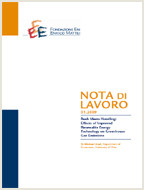Health-enhancing Activities and the Environment:How Competition for Resources Makes the Environmental Policy Beneficial

27.11.2009
Xavier Pautrel
Q5
Growth, Environment, Health, Overlapping Generations
Climate Change and Sustainable Development
Carlo Carraro
In a two-period overlapping generations model, this paper demonstrates that the relationship between the environmental taxation and the economic activity (level- and growth-output) becomes inverted-U shaped, when the detrimental impact of pollution on health and the private decision of each working-age agent to improve her health are taken into account. Especially, a tighter environmental tax is more likely to promote (rather than to harm) output-level and –growth when health is very sensitive to pollution, the weight of health in preferences is high, the polluting capacity of the production technology is high and the rate of natural purification of pollutants is low. The inverted-U shaped relationship between the environmental tax and the economic activity is due to a positive effect arising from the competition for resources between the final output sector and the health-enhancing activities that offsets the conventional detrimental “drag-down effect” for low values of the environmental tax. We also demonstrate that the link between the environmental tax and the lifetime welfare is inverted-U shaped as well. Finally, we investigate the social optimum and the determinants of the optimal environmental tax.
